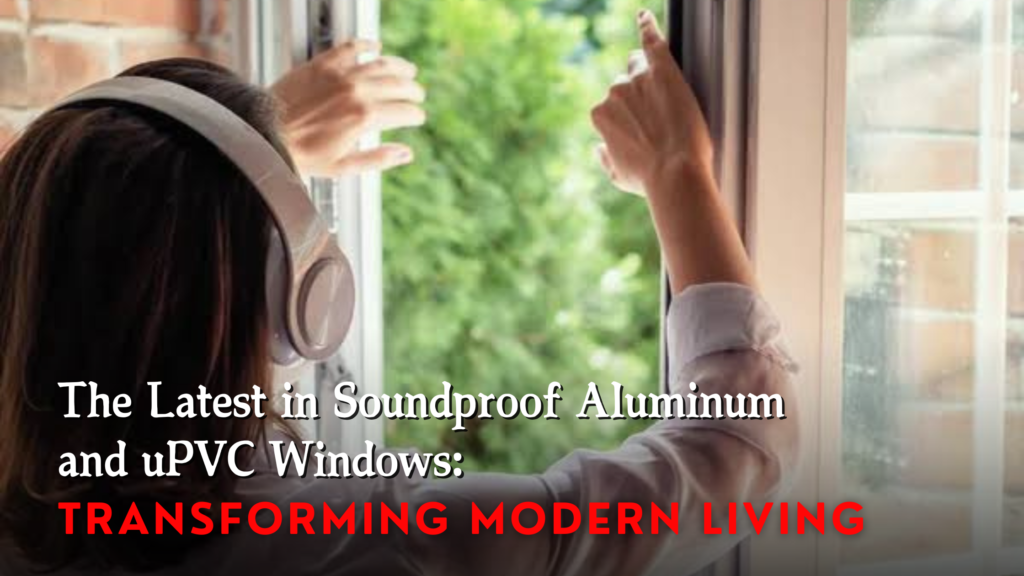
Aluminum Windows Cleaning Process: A Comprehensive Guide

Trends in Aluminum Sliding and Bifold Doors
The Latest in Soundproof Aluminum and uPVC Windows: Transforming Modern Living

In today’s bustling world, noise pollution is a common issue affecting urban living. Between the blaring horns of vehicles to the clamber of construction, there is usually no quietude in or around the household due to the ever-present din which interferes with rest and work. In this regard, soundproof aluminum windows come in handy.
Windows made of aluminum or uPVC and other materials are said to be good soundproof options simply because they are able to omit excessive noise from the environment, so incorporating these windows in contemporary designs may be highly effective.
These windows are also becoming better at noise cancellation, energy conservation, and increasing levels of comfort. Let’s explore the latest trends, technologies, and benefits of soundproof aluminum windows and uPVC windows that are transforming modern homes and offices.
The Evolution of Soundproof Windows
Soundproof windows have come quite a distance from basic designs which did little else than block out some sound noise. The most contemporary soundproof aluminum windows use engineering and new materials to achieve a higher level of soundproofing.
The most popular materials for these windows include aluminum and uPVC (unplasticized polyvinyl chloride), both chosen for their durability, aesthetic appeal, and ability to support complex window structures.
Modern soundproof windows utilize state-of-the-art glass technologies consisting of a number of obliques, gas fills, and insulative layers which eliminate sound movement.
Understanding Soundproofing Technology
The methods available for soundproofing include the following:
Thicker Glass and Multiple Panes:
Soundproof aluminum windows consist of multiple panes separated by air or gas. Usually, windows will consist of double glazing where two panes of glass are separated by an air-filled cavity. Sound waves that try to get through are redirected due to this construction of the window.
Special Laminated Structures:
Laminated glass is made with two sheets of glass enclosing a clear polyvinyl butyral (PVB) layer. The layer in such windows is used to reduce the propagation of sound waves, whilst providing extra strength to the window against impact.
Thermal and Acoustic Insulation:
Soundproof windows often come with specialized gas fillings like argon or krypton, which increase the thermal insulation while also improving sound reduction.
Frame Material:
uPVC and aluminum frames help in the soundproof feature by reducing the sound vibrations from the source. Lightweight and strong aluminum frames complement the strength of the windows, while excellent thermal and acoustic characteristics are inherent to uPVC frames giving high-quality insulation.
uPVC Windows: Affordable and High-Performance Soundproofing
Both commercial and residential buildings have been utilizing uPVC windows for soundproofing due to their reasonable prices and great explosion qualities over time.
Best soundproof windows have great soundproofing qualities, do not corrode easily, and are effective insulators making them quite effective when placed inside buildings in urban areas.
Benefits of Soundproof uPVC Windows:
- Reduced Costs: Due to their low pricing, uPVC windows can be easily employed in a multitude of applications as a substitute for aluminum windows without sacrificing effectiveness.
- Great Insulation Performance: Since uPVC has a low thermal conductivity, even with thin strands of uPVC, heat and sound cannot easily pass through, which improves sound and energy efficiency.
- Requiring No Maintenance: After the construction of the house, these windows do not require maintenance as uPVC does not decay, and its material does not get affected by moisture.
- Enhanced Comfort and Privacy: By minimizing external noise, these windows create a tranquil environment that improves comfort and enhances privacy.
- Increased Energy Efficiency: Soundproof windows with double or triple glazing can reduce heating and cooling costs, as they help maintain indoor temperatures by minimizing heat transfer.
- Boosted Property Value: Properties equipped with high-quality soundproof windows are more attractive to buyers, as they offer additional comfort and energy efficiency.
- Environmental Benefits: Improved insulation reduces energy consumption, which lowers carbon footprints and supports environmentally conscious living.
Newer uPVC windows through improved design these days have multi-chamber profiles which add better soundproofing, with air pockets encased within the frames giving wider elements, stunning design, and maximizing overall efficiency.
Innovations in Soundproof Glass Technology
The glass used in soundproof windows has undergone significant innovation, providing higher sound reduction and thermal insulation:
- Double and Triple Glazing: Windows with double or triple glazing incorporate multiple glass panes, separated by gas-filled spaces. This construction acts as a buffer to sound waves, preventing them from entering the space.
- Acoustic Lamination: A specialized PVB layer within laminated glass dampens sound vibrations. This option is popular in areas with excessive noise levels, such as busy streets or airports.
- Smart Glass Options: Many soundproof windows now include smart glass options, which use electrochromic technology to adjust the tint of the window in response to sunlight. This reduces glare, improves energy efficiency, and contributes to a more peaceful indoor environment.
Choosing Between Aluminum and uPVC Soundproof Windows
The following options help you decide between aluminum and uPVC windows.
- Price: uPVC frames are comparatively cheaper and hence suitable for budget seekers.
- Aesthetic Value: Sticking to modern outlooks would mean aluminum frame windows which are the best in current trends. uPVC, which is very accommodating, has quite traditional designs.
- Environment: If you reside in noise-prone areas like industries or busy highways, think about using thicker glass or laminated and acoustic glass to cut noise.
Future Trends in Soundproof Windows Technology
Numerous improvements take place in soundproofing windows… some approaches to watch:
- Recyclable Materials: Glass and uPVC frames increasingly use recyclable materials to get aluminum.
- Smart Integration: Smart windows with automated blinds, self-tinting capabilities, and connectivity to home automation systems are growing in popularity.
- Nanotechnology in Soundproofing: Ultra-thin materials are being developed all over for windows and walls to achieve extremely high levels of soundproofing with at least nanotechnology involvement.
To Wrap Up
Soundproof aluminum windows and uPVC windows continue to impress homeowners and office owners with their design, comfort, cost-effectiveness, and energy efficiency. More importantly, new developments in glass and frame materials technologies will always improve this area field and adapt it to the needs of modern megacities.
Wondering soundproof windows cost? You can contact us now to know more. Be it in aluminum’s streamlined resiliency or the budget-friendly efficiency of uPVC, it is profitable to have soundproof windows in any area in the contemporary style that can help individuals look for tranquility amid the chaos of daily life.





